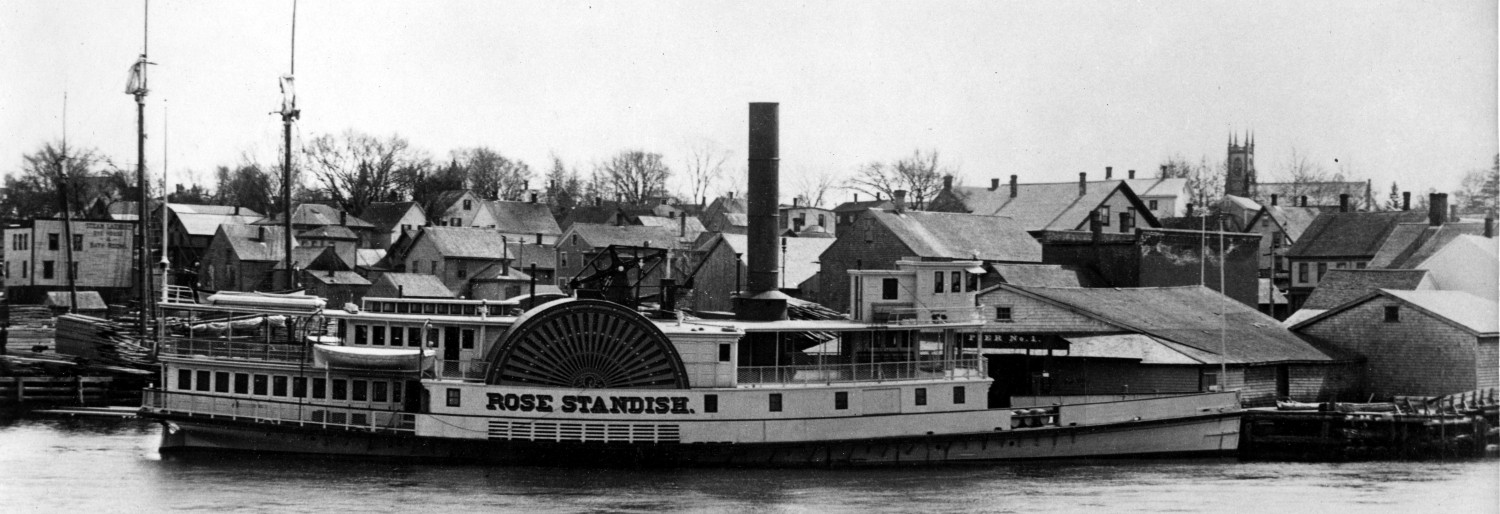While the war wasn’t the only news in 1943, it dominated the newspapers and radio which were the primary news sources in the 40s. Any attempt to summarize the war news from Europe and the Pacific would be futile. It can be said however that, while the Allies did not win the war in 1943, they drove the Germans from North Africa and gained a toehold in Italy. On the Russian Front Hitler lost an entire army group at Stalingrad and at the battle of Kursk, 2,900 German tanks were captured or destroyed by the Russians. More importantly, many of Hitler’s best soldiers were either killed or captured in these battles.
American forces were not yet in Europe, but the Allies spent 1943 planning the landing in France and appointed Dwight Eisenhower as commander in chief of the forces over British General Montgomery, who didn’t take the slight as a team player. His petulance caused a good deal of discord.
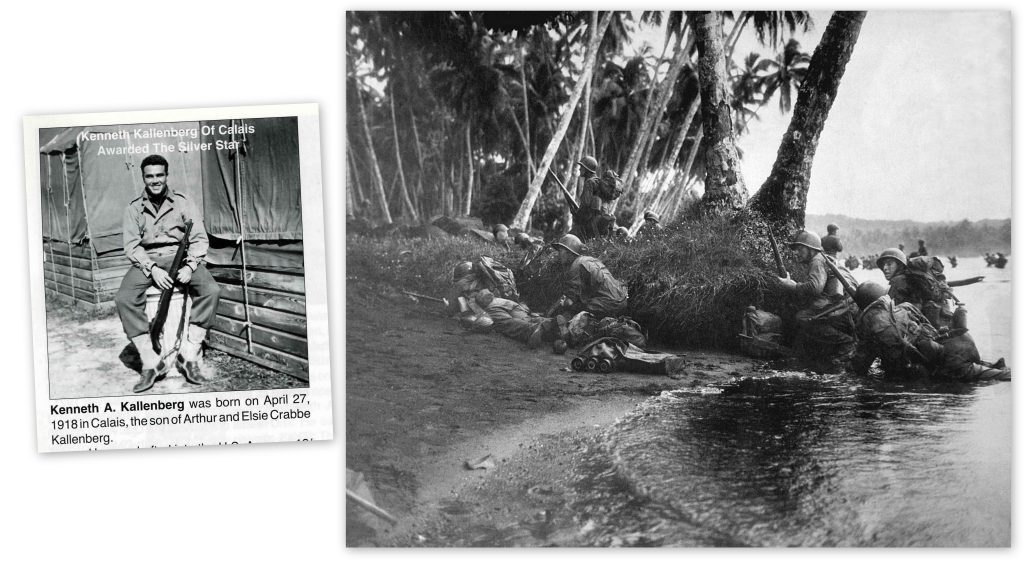
In 1943 U.S. forces were heavily engaged in the Pacific and many local men were in the army, navy and marines as U.S. forces drove the Japanese back island by island throughout 1943. Ken Kallenberg of Calais went from a promising career as a pitcher for the New York Giants to a rifleman with the 43rd Infantry and into the swamps and jungles of Guadalcanal, the Northern Solomons, New Guinea and Luzon. He was wounded by shrapnel in 1943 and suffered two additional wounds which put paid to his baseball career. On Luzon in 1945 he won the Silver Star for valor.
Also in the Pacific Theatre were Bobby Frye, Elwyn Sharpe and Angus McMicken of Calais. McMicken was seriously injured in combat. Ralph Lincoln’s parents in Robbinston were notified that he was missing in action and in 1944 his death was confirmed. Gerald McGarrigle of Calais was on the carrier Midway when it was sunk at the Battle of Midway. He swam for five hours before being picked up.
Calais’s Malcolm “Doc” Foster was captured by the Japanese on Bataan in 1942 and barely survived the infamous Bataan Death March. He rates Christmas 1943 as the happiest day of his long captivity because he received a care package from home. At the time he was a POW at Clark Field in the Philippines but was soon sent to Japan to work in a copper mine where over a third of his 500-man contingent died of overwork and deprivation.
Fighting in Africa were Cecil Beers of Vanceboro and Phil Donovan of Calais. U.S. troops were badly bloodied at Kasserine Pass in their first encounter with the Germans in February 1943. Arthur Kallenberg, Ken’s father and a writer for the Advertiser, claimed that the fault rested entirely with the superiority of German tanks, a position with which Eben Glidden of Princeton, a member of an anti-tank unit in Africa, would surely have agreed.
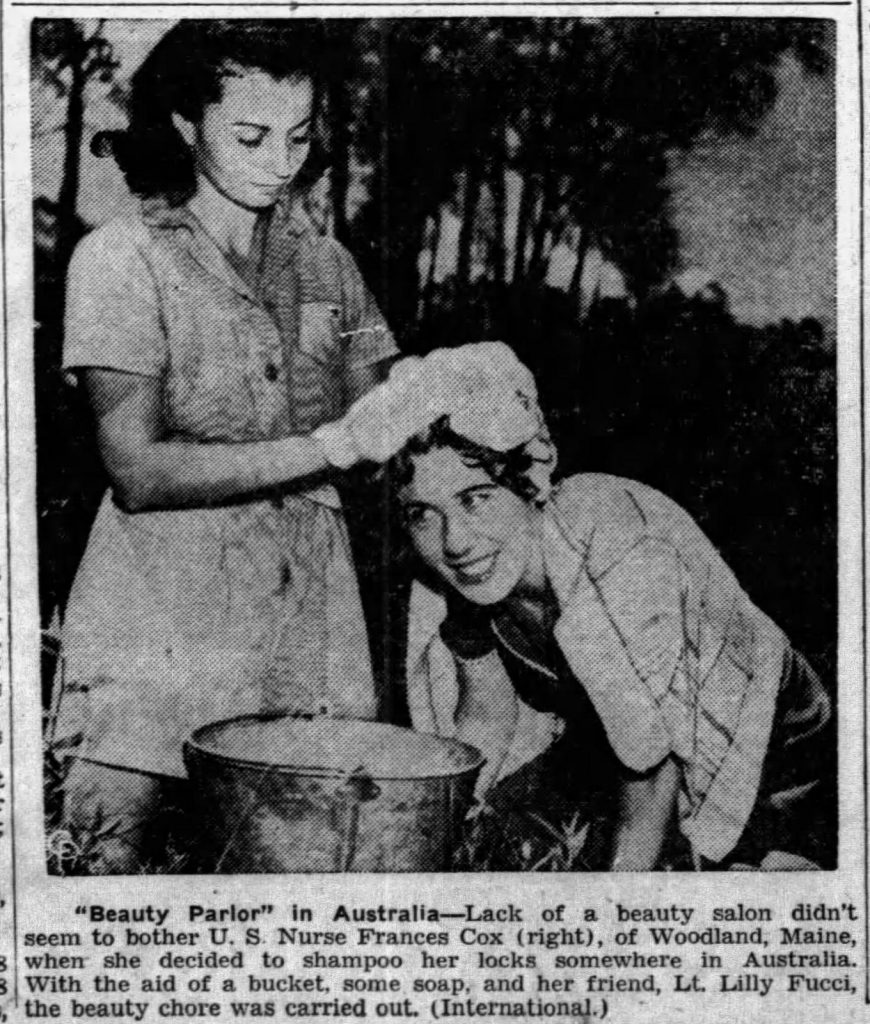
Frances Cox of Woodland made nearly all the national papers by getting a shampoo in Australia.
In the national news, Frank Sinatra made his radio debut, most of baseball’s best players enlisted, including Joe DiMaggio – but the damn Yankees still won the pennant. Teams were stocked with teenagers, wizened over the hill veterans and a one-armed pitcher. In football, the Lions and Giants played the game’s last scoreless tie. James Cagney and Greer Garson won Academy Awards, the Boston Bruins won the Stanley Cup and Upton Sinclair won a Pulitzer for Dragon’s Teeth.
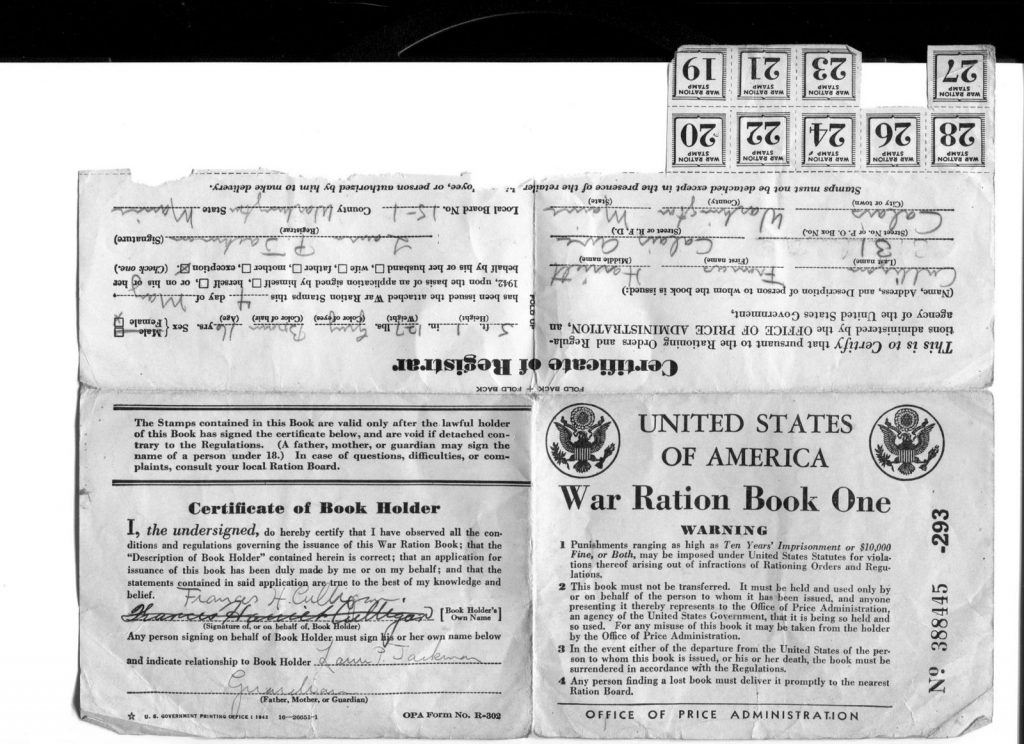
It was impossible to forget the war in 1943 for even a day because the basic necessities of life were rationed: shoes, gasoline, fuel oil, tires for your car and, of course, food. The rationing system was complex, sometimes inscrutable and ever changing. Leo Phelan owned a grocery store on North Street and did his best to educate folks, but the complexities were such that even the geniuses at Los Alamos would probably have gone hungry.
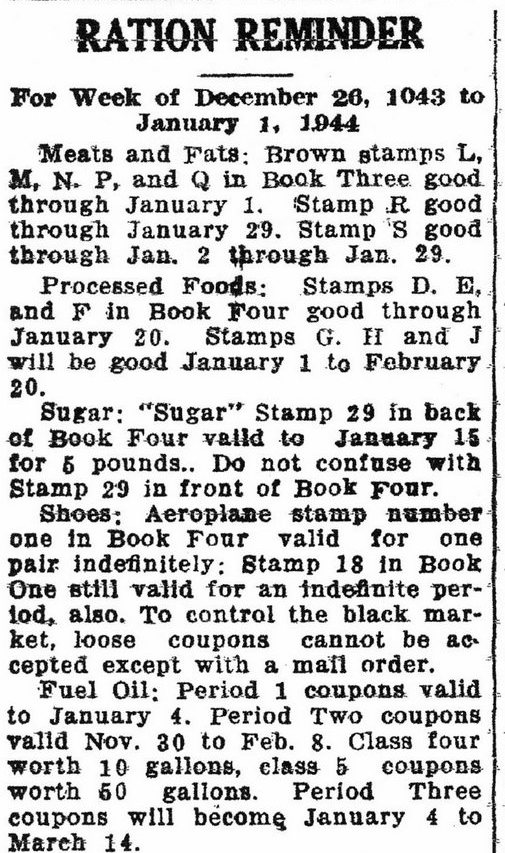
Further the rules were arbitrary, irrational, and counterproductive.
The Telegraph-Forum of Bucyrus Ohio and many other national newspapers sympathized with our peculiar situation:
July 7, 1943:
POINTS ACROSS THE BORDER
Down East residents who go across the border to buy on the New Brunswick side foods which are rationed in the United States are going to have to surrender ration coupons anyway. United States customs men have been instructed to count out in ration points all such foods brought back by the border-crossers and that may make sense — but it’s hard to see just how it can.
The widely advertised purpose in rationing scarce commodities is to prevent the total disappearance of such articles from the market — as they would disappear if hoarders and panic buyers were permitted to dip in and help themselves. But if a Calais Me housewife goes across the border and buys a pound of butter, for example, in St Stephen, it would seem she was not contributing to the scarcity of butter in the United States of America rather that she was thereby making an extra pound of butter available for some fellow countryman.
Now thanks to this points-across-the-border ruling any surpluses that may exist in New Brunswick apparently will continue to be surpluses. They will not be allowed to relieve any shortages existing in Maine for certainly nobody’s going to hike over to Canada to buy articles which are on sale at the corner grocery in Calais so long as the “cost” in rationing points is to be the same in either case. Bureaucracy wins again.
We do want to point out that it is unlikely bureaucracy actually did win again. Smuggling had been refined to such a fine art on the border over the centuries that we doubt many ration coupons were collected. Rather baby carriages, sagging under the weight of butter, sugar and flour and a baby, whose pink bottom was separated from the above rationed food by just a thin blanket, would not have been challenged by any inspector who wanted to sleep at home that night.
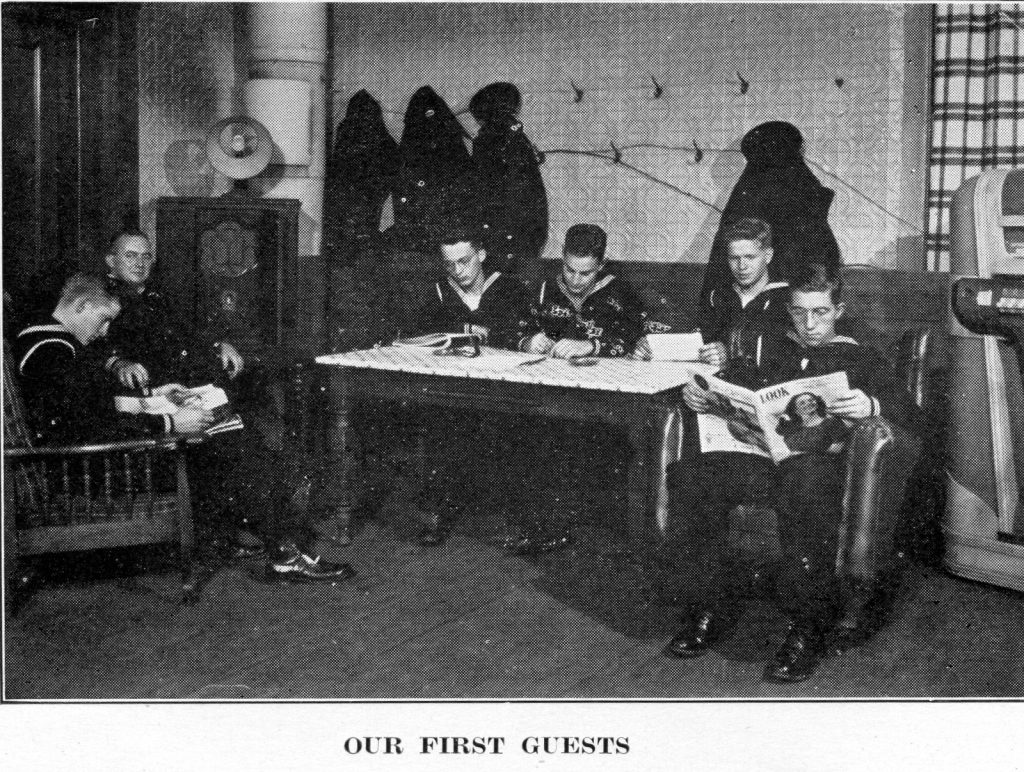
Most local news on the crime front involved fights and the disorderly conduct by the thousands of Seabees from Quoddy Village and airmen from the RAF base in Pennfield NB who came to Calais for a good time. The Advertiser reported that bootlegging was a big problem as most of the revelers arrived in town after the liquor store had closed. A fifth that sold for $2.25 at the State store sold for $10.00 at midnight. The Advertiser commented “It ain’t right!” In the same paper the Advertiser reported a raid on the Ambassador Dance Hall on Monroe Street where the “madam” was arrested and fined $100 for bootlegging.
The Advertiser also pointed out that there was no gasoline to be bought in town even if you had a permit to drive a vehicle. Only essential travel and “one round trip in the Eastern shortage area for vacation travel or travel to summer homes” was allowed. We are not sure if this limitation was yearly or for some shorter period. Converting to wood or coal heat was required as little heating oil was available but there was no coal except in Canada.
The Montana Bulletin of Butte Montana reported on September 29, 1943:
Trucks from Canada, carrying American anthracite coal, are rolling into Calais, Maine to make deliveries to residents of that town, while Calais dealers are unable to get coal to sell, according to one of the strangest developments in the New England coal shortage.
The paper went on to question why the folks in St. Stephen were getting more American coal than American merchants.
What the Advertiser described as “One of the most intense manhunts seen in this section in recent years” began when two Milo lads went missing on Saturday June 11th.
The Daily Times of Ohio and other national papers followed the manhunt with interest.
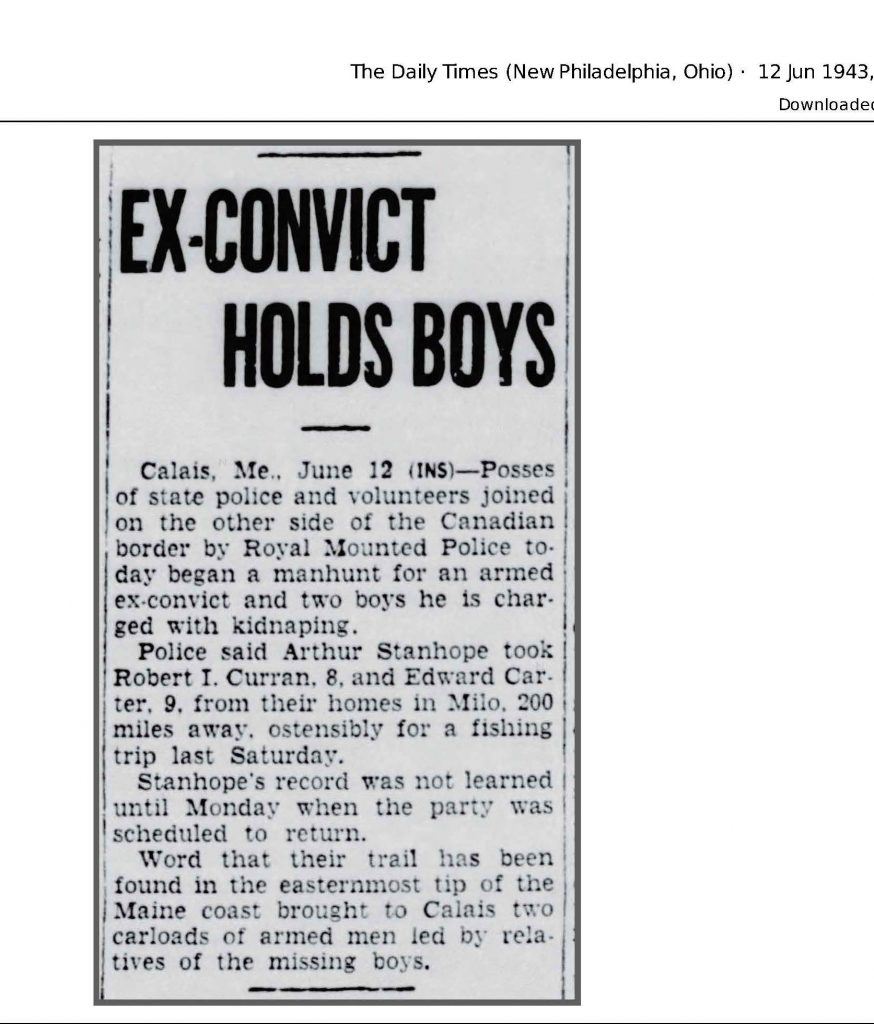
According to the Advertiser:
What started out to be a fishing expedition to the Bangor Salmon Pool turned out to be a weeklong trip for two 9-year-old Milo lads, Damon Carter and Robt. Curran during which the boys became the object of an international search, and during which their friend and companion, and leader of the expedition, Arthur B. Stanhope, was frantically sought by United States and Canadian police officers and civilian posses, after a warrant had been issued by the Town Clerk of Milo, for his arrest on abduction charges.
The posse and police initially searched the area around Beaver Lake where some of the boy’s possession were found at a camp but there was no sign of the boys until Thursday when a local youth informed the police the boys could be found at Todd’s Point in St. Stephen. The Mounties searched the area and found evidence confirming the tip, but it was Saturday before Kevin McIntee, a local truck driver, saw the two boys walking along the road near Todd’s Point. The boys ran into the woods, but McIntee pursued and caught them and handed them over to the Mounties. Meanwhile Stanhope escaped and managed to find his way to the roundhouse at Salmon Falls where he was cornered and arrested. He was sentenced to five years for kidnapping.
June of 1943 saw another frantic search when the Home Guard was mobilized to find the parachutist who had been dropped from an unidentified plane near Grand Lake Stream. The parachutist was never found and almost certainly never existed. These sorts of false reports were common during the war especially on the coast where a few German saboteurs did actually come ashore.
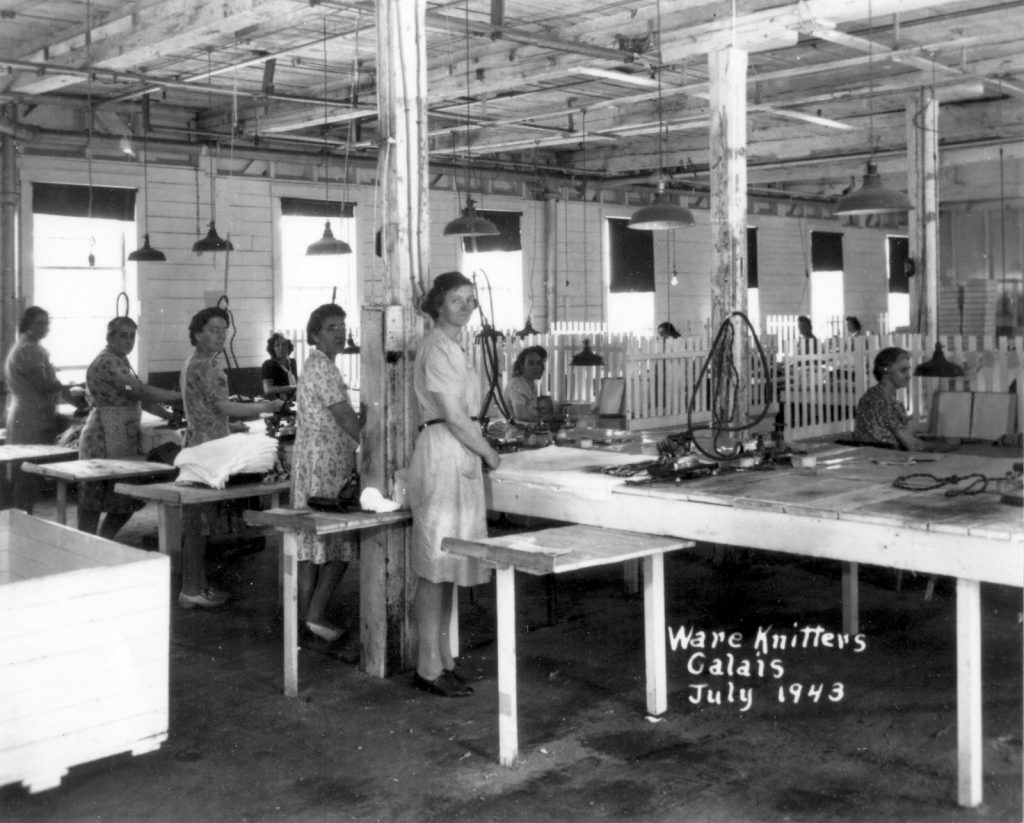
After the shoe factory at the bottom of Barker Street closed in the late 30s, the building was empty for many years, but this all changed with the war and the need for uniforms and other military kit. Ware Knitters of Wareham, Mass set up shop in the old factory and employed hundreds of workers.
Princeton made the news in Bennington, Vermont in 1943. On November 22, 1943, The Bennington Banner of Bennington reported that “when word spread Saturday noon that two car and trailer loads of deer were parked on Main Street, boys and men flocked to where the venison was parked to feast their eyes on the sight.” A local reporter asked the owners of the vehicles about the deer, but they refused to provide any information other than that the deer were shot in Princeton, Maine. The reporter observed the men’s attire looked as if it had just come out of the box and was without a smudge of dirt and “It is the first time in the reporter’s experience that hunters have refused to talk about their prowess.” We have two questions-which Princeton guide shot the deer and how had the hunters managed to obtain enough rationed gas to travel to Princeton? We do know the hunters didn’t stay at the popular Lakeview Hotel in Princeton. It burned to the ground in July 1943.
Meddybemps was honored on the national “Bondwagon” radio program in 1943 for being the first community in the nation to “go 100 per cent salary deduction for War Bonds.”
In August 1943, Albert Perkins, an 80-year-old Woodland man, was charged with manslaughter after he killed Norman Leland, 12, with one shot to the head from a .38 caliber rifle, killing the boy almost instantly. Perkins claimed he didn’t believe the gun was loaded and just wanted to scare a group of boys who were tormenting him. At trial in Machias in November 1943 Perkins was found not guilty.
From the Bangor Daily News:
Aged Baileyville Man Not Guilty of Manslaughter
MACHIAS Oct 20— A Washington county Superior Court traverse Jury tonight found Alfred Perkins 80 of Baileyville not guilty of manslaughter in the fatal shooting of Norman Leland 12 at Woodland Junction last August 22. The jury retired at 4:22 this afternoon and two hours later asked for instructions. At 8:40 this evening Justice Arthur Sewall called the jury in and read it citations and at 9:15 the jury reported a verdict of not guilty. Perkins was on the stand in his own defense today and several youths who were playing with Leland in the yard at the home of Perkins’ son at the time of the fatal shooting also were witnesses for the defense. Witnesses for the state were heard after the opening of the trial yesterday. Mrs. Olive Kidder next-door neighbor of Perkins testified that she had seen Perkins show Leland and several other boys who were teasing the aged man outside the home that the rifle with which Leland later was fatally shot was loaded. Sheriff Ray S Foster and Deputy Sheriffs Walter King and Harvey Smith quoted Perkins as claiming he did not know the rifle was loaded. King also told how the aged man had complained that the boys had sworn at him called him names and otherwise teased him. Tom Bridges was counsel for Perkins.
Antonnia Gagner became Woodland’s first Four Star mother in 1943 having four sons, Harvey, Albert, Ernest and Phillip serving in the armed forces.
We’ll end 1943 with one of our favorite 1943 photos and Adolf Hitler’s 1943 Christmas card.
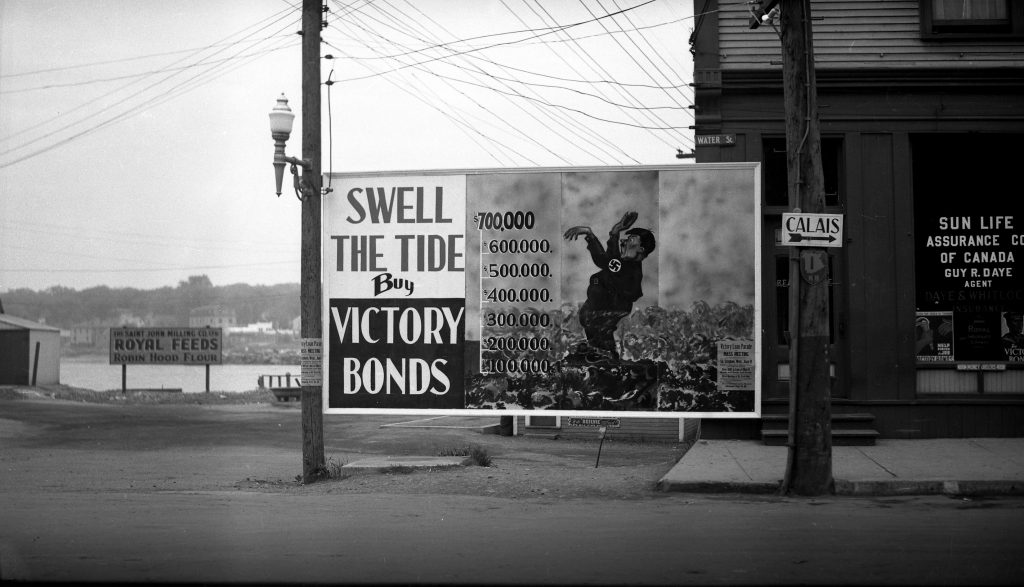
This billboard of Hitler engulfed in a roiling sea was on Water Street in St Stephen. The poster in the lower right corner advertises a Victory Loan Parade and mass meeting.
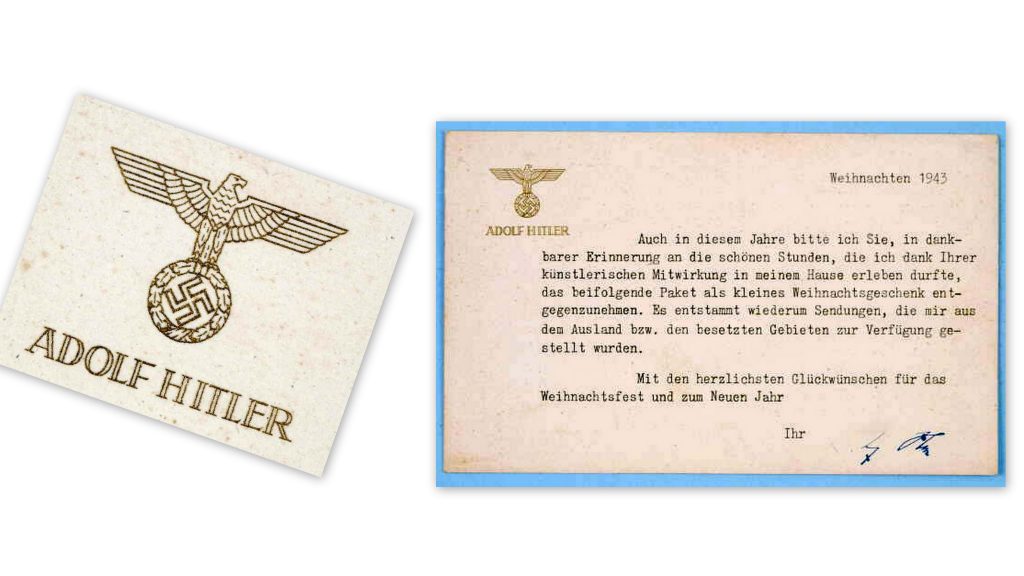
Some may find it surprising that Hitler sent Christmas cards. Above is his 1943 card and perhaps his last as by December 1944 the Russians were driving on Berlin and Hitler was planning his last-ditch effort in the West which became known as “The Battle of the Bulge.” While raised a Catholic he seems to have abandoned the church as a young man but he often claimed in later years to be Christian although with some decidedly odd views on faith.
A rough translation is:
Even in this year, I would like you to accept as a thankful remembrance of the pleasant hours which I was able to experience in my home, thanks to your artistic involvement, a package which will arrive separately, as a small Christmas gift. It comes from, in turn, articles that were made available to me from abroad or from occupied territories. With most cordial wishes for the Christmas holiday and in the New Year, (signature: A. Hitler)
It is chilling to consider what sort of “articles” Hitler had obtained from abroad and the occupied territories and even more chilling to imagine the fate of the prior owners.
